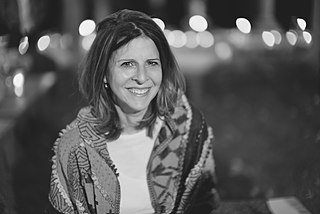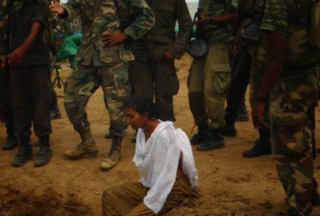
The Sri Lankan Civil War was a civil war fought in Sri Lanka from 1983 to 2009. Beginning on 23 July 1983, it was an intermittent insurgency against the government by the Liberation Tigers of Tamil Eelam led by Velupillai Prabhakaran. The LTTE fought to create an independent Tamil state called Tamil Eelam in the north-east of the island, due to the continuous discrimination and violent persecution against Sri Lankan Tamils by the Sinhalese-dominated Sri Lanka government.

Sri Lankan cinema encompasses the Sri Lankan film industry. It is a fledgling industry that has struggled to find a footing since its inauguration in 1947 with Kadawunu Poronduwa produced by S. M. Nayagam of Chitra Kala Movietone. Sri Lankan films are usually made in Sinhala and Tamil, the dominant languages of the country.
The Pulitzer Center on Crisis Reporting is an American news media organization established in 2006 that sponsors independent reporting on global issues that other media outlets are less willing or able to undertake on their own. The center's goal is to raise the standard of coverage of international systemic crises and to do so in a way that engages both the broad public and government policy-makers. The organization is based in Washington, D.C.
Grierson: The British Documentary Awards or more informally, The Grierson Awards as they are known, are awards bestowed by The Grierson Trust to recognise innovative and exciting documentary films, in honour of the pioneering Scottish documentary filmmaker John Grierson.
War crimes during the final stages of the Sri Lankan Civil War are war crimes and crimes against humanity which the Sri Lanka Armed Forces and the Liberation Tigers of Tamil Eelam have been accused of committing during the final months of the Sri Lankan Civil War in 2009. The war crimes include attacks on civilians and civilian buildings by both sides; executions of combatants and prisoners by both sides; enforced disappearances by the Sri Lankan military and paramilitary groups backed by them; sexual violence by the Sri Lankan military; the systematic denial of food, medicine, and clean water by the government to civilians trapped in the war zone; child recruitment, hostage taking, use of military equipment in the proximity of civilians and use of forced labor by the Tamil Tigers.

Leena Manimekalai is an Indian filmmaker, poet and an actor. Her works include five published poetry anthologies and several films in genres, documentary, fiction and experimental poem films. She has been recognised with participation, mentions and best film awards in many international and national film festivals.
With the Sri Lankan Civil War spanning for nearly 30 years (1983–2009), the conflict has been portrayed in a variety of ways in popular culture, both during the war and after its conclusion.

Sri Lanka's Killing Fields is an investigatory documentary about the final weeks of the Sri Lankan Civil War broadcast by the British TV station Channel 4 on 14 June 2011. Described as one of the most graphic documentaries in British TV history, the documentary featured amateur video from the conflict zone filmed by civilians and Sri Lankan soldiers which depicted "horrific war crimes".

Lies Agreed Upon is a documentary produced by Sri Lanka Ministry of Defence in response to a documentary aired by Channel 4, named Sri Lanka's Killing Fields, about the final weeks of the Sri Lankan Civil War. The documentary gives the Sri Lanka Ministry of Defence response to war crimes accusations and rebuts points made by the producers of the Channel 4 documentary, who presented it as "a forensic investigation into the final weeks of the quarter-century-long civil war between the government of Sri Lanka and the secessionist rebels, the Tamil Tigers." Lies Agreed Upon was first aired at an official function held at Hilton Colombo on 1 August 2011, one and half months after the broadcasting of "Sri Lanka's Killing Fields". Ministry of Defence released another report named Humanitarian Operation – Factual Analysis : July 2006 – May 2009 on the same day.

Callum Macrae is a Scottish filmmaker, writer and journalist currently with Outsider Television, which he had co-founded with Alex Sutherland in 1993.

Sri Lanka's Killing Fields: War Crimes Unpunished is an investigatory documentary about the final weeks of the Sri Lankan Civil War broadcast by the British TV station Channel 4 on 14 March 2012. It was a sequel to the award-winning Sri Lanka's Killing Fields which was broadcast by Channel 4 in June 2011. Made by film maker Callum Macrae, this documentary focused on four specific cases and investigated who was responsible for them. Using amateur video from the conflict zone filmed by civilians and Sri Lankan soldiers, photographs and statements by civilians, soldiers and United Nations workers, the documentary traced ultimate responsibility for the cases to Sri Lanka's political and military leaders. The documentary was made by ITN Productions and presented by Jon Snow, the main anchor on Channel 4 News. The Sri Lankan government has denied all the allegations in the documentary.

The 2013 Commonwealth Heads of Government Meeting was the 23rd Meeting of the Heads of Government of the Commonwealth of Nations. It was held in Colombo, Sri Lanka, from 15 to 17 November 2013. Commonwealth leaders agreed on Sri Lanka as the 2013 host for the meeting when they met in Port of Spain, Trinidad and Tobago, in 2009. Sri Lanka, which was originally slated to host the summit in 2011, was accused of committing atrocities during the Sri Lankan civil war and the summit was instead held in Perth, Australia; Colombo was given the 2013 summit instead. The leaders of Canada, Mauritius, and India boycotted the summit, citing alleged human rights violations by Sri Lanka against its Tamil minority. Protests were also banned during the summit. President Mahinda Rajapaksa summarised the summit's events as: "Issues covered in the communique include development, political values, global threats, challenges and Commonwealth cooperation." However, the meeting was overshadowed by controversy over Sri Lanka's human rights record and the alleged war crimes during the final stages of the civil war. This was the first time in 40 years that the Head of the Commonwealth, Queen Elizabeth II, was not present at the CHOGM.

Amy Ziering is an American film producer and director. Mostly known for her work in documentary films, she is a regular collaborator of director Kirby Dick; they co-directed 2002's Derrida and 2020's On the Record, with Ziering also producing several of Dick's films.
Balachandran Prabhakaran was the third child of Velupillai Prabhakaran, the founder and leader of the Liberation Tigers of Tamil Eelam movement.

Shoba, also known as Shobana Dharmaraja, was a Sri Lankan Tamil journalist and television broadcaster for the rebel Liberation Tigers of Tamil Eelam (LTTE). She died in the final days of the Sri Lankan Civil War in 2009 with video evidence that she was captured by the Sri Lankan military before being raped, tortured and murdered. A senior United Nations official deemed the footage to be authentic. Amnesty International and Human Rights Watch also verified that it was her.
This Land Belongs to the Army is a 2014 documentary film by Indian journalist and filmmaker Maga.Tamizh Prabhagaran. This film shows Sri Lankan civil war and shows the current post-war status of Sri Lanka. It also shows several controversial acts by the Sri Lankan government and the armed forces including Sinhalization and Land grabbing by the military. The film also features new testimonies from Tamil victims and an exclusive interview with a who is said to be a Sri Lankan Army officer, who speaks about the use of chemical and heavy weapons during the civil war.
Chemical weapons were reported to have been used by the Sri Lankan military and the rebel Liberation Tigers of Tamil Eelam (LTTE) during the Sri Lankan Civil War.
Sri Lanka: The Search for Justice is an investigative documentary about the final weeks of the Sri Lankan Civil War by Callum Macrae.The documentary is about the search for justice for thousands of Sri Lankan Tamils and supports international justice rather than a domestic process. It is being released under a slogan #LetThem Be Heard.
The Mullivaikkal massacre was the mass killing of tens of thousands of Sri Lankan Tamils in 2009 during the closing stages of the Sri Lankan Civil War, which ended in May 2009 in a tiny strip of land in Mullivaikkal, Mullaitivu.
Varatharajah Thurairajah is an Eelam Tamil physician and human rights activist. He was noted as one of the official witnesses for the United Nations investigations on war crimes and human rights violations in Sri Lanka. He is a first-hand witness of the events in the "No Fire Zone" in Mullivaikkal, Mullaitivu; and has revealed information to the world about the planned genocide of Tamils in 2009. He is currently engaged in activities related to creating awareness about the issue.










